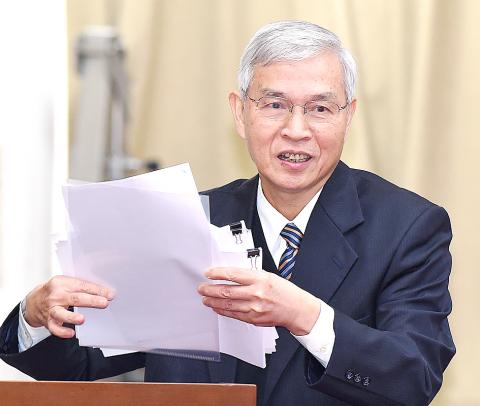Central bank Deputy Governor Yang Chin-long (楊金龍) has reportedly won the nomination as the nation’s top monetary policymaker after Governor Perng Fai-nan (彭淮南) retires on Feb. 25.
In an exclusive report yesterday, the Chinese-language Liberty Times (the sister newspaper of the Taipei Times) broke the news, which is consistent with market expectations.
The long-awaited appointment, which still requires confirmation from the Presidential Office and the Executive Yuan, would make Yang the central bank’s first deputy to become governor.

Photo: Liao Chen-huei, Taipei Times
He is expected to extend Perng’s “dynamic stability” approach in dealing with foreign exchange.
Yang, 64, who earned his doctoral degree in economics from the University of Birmingham in 1989, served in the central bank’s research, foreign exchange and banking departments, and was its representative in its London office, before becoming deputy governor in 2008.
His purported appointment appears to be a safe call, as he is familiar with the central bank’s duties and operations, and would help stabilize the foreign exchange market, Taiwan Institute of Economic Research (台灣經濟研究院) economist Gordon Sun (孫明德) said.
“It is time the central bank sends foreign funds a message that it will not sit around tolerating drastic appreciations of the local currency,” Sun said.
Foreign exchange policy represents the No. 1 challenge for the next governor, as it has a profound bearing on Taiwan’s export-reliant economy, he said.
The New Taiwan dollar has gained 2.5 percent against the US dollar this year after picking up 8.14 percent last year.
In a rare move, the central bank on Thursday blamed the greenback’s volatility on interventions by the administration of US President Donald Trump.
US Secretary of the Treasury Steven Mnuchin on Wednesday told the World Economic Forum in Davos, Switzerland, that a weaker US dollar is in the interest of the US as it relates to trade, the central bank said in a statement.
Mnuchin’s predecessors believed in a strong greenback to advance the same purpose, it added.
“While it is impractical to battle the global trend, the central bank can still weigh in and slow the pace to allow local firms some buffers,” Sun said.
Foreign exchange losses last year totaled NT$176.1 billion (US$6.05 billion) for domestic life insurance companies alone, eroding their profits by 60 percent, Financial Supervisory Commission data showed.
Chung-Hua Institution for Economic Research (中華經濟研究院) head economic researcher Liu Meng-chun (劉孟俊) said the most formidable challenge for Yang would be to continue the central bank’s independent operation, which many have attributed to Perng’s professional and personal prestige.
Perng has been rated as one of the world’s top-tier central bankers by New York-based magazine Global Finance for 14 consecutive years and last week won a lifetime achievement award from global Central Banking Publications.
“It remains to be seen if Yang, a long-standing loyal deputy governor, can step out of Perng’s shadow and command support from ruling and opposition camps for his policy decisions,” Liu told the Taipei Times.
To avoid controversy, Yang might take cues from Perng and put economic stability ahead of corporate profitability, Liu said.

CHAOS: Iranians took to the streets playing celebratory music after reports of Khamenei’s death on Saturday, while mourners also gathered in Tehran yesterday Iranian Supreme Leader Ayatollah Ali Khamenei was killed in a major attack on Iran launched by Israel and the US, throwing the future of the Islamic republic into doubt and raising the risk of regional instability. Iranian state television and the state-run IRNA news agency announced the 86-year-old’s death early yesterday. US President Donald Trump said it gave Iranians their “greatest chance” to “take back” their country. The announcements came after a joint US and Israeli aerial bombardment that targeted Iranian military and governmental sites. Trump said the “heavy and pinpoint bombing” would continue through the week or as long

TRUST: The KMT said it respected the US’ timing and considerations, and hoped it would continue to honor its commitments to helping Taiwan bolster its defenses and deterrence US President Donald Trump is delaying a multibillion-dollar arms sale to Taiwan to ensure his visit to Beijing is successful, a New York Times report said. The weapons sales package has stalled in the US Department of State, the report said, citing US officials it did not identify. The White House has told agencies not to push forward ahead of Trump’s meeting with Chinese President Xi Jinping (習近平), it said. The two last month held a phone call to discuss trade and geopolitical flashpoints ahead of the summit. Xi raised the Taiwan issue and urged the US to handle arms sales to

State-run CPC Corp, Taiwan (CPC, 台灣中油) yesterday said that it had confirmed on Saturday night with its liquefied natural gas (LNG) and crude oil suppliers that shipments are proceeding as scheduled and that domestic supplies remain unaffected. The CPC yesterday announced the gasoline and diesel prices will rise by NT$0.2 and NT$0.4 per liter, respectively, starting Monday, citing Middle East tensions and blizzards in the eastern United States. CPC also iterated it has been reducing the proportion of crude oil imports from the Middle East and diversifying its supply sources in the past few years in response to geopolitical risks, expanding

Pro-democracy media tycoon Jimmy Lai’s (黎智英) fraud conviction and prison sentence were yesterday overturned by a Hong Kong court, in a surprise legal decision that comes soon after Lai was jailed for 20 years on a separate national security charge. Judges Jeremy Poon (潘兆初), Anthea Pang (彭寶琴) and Derek Pang (彭偉昌) said in the judgement that they allowed the appeal from Lai, and another defendant in the case, to proceed, as a lower court judge had “erred.” “The Court of Appeal gave them leave to appeal against their conviction, allowed their appeals, quashed the convictions and set aside the sentences,” the judges